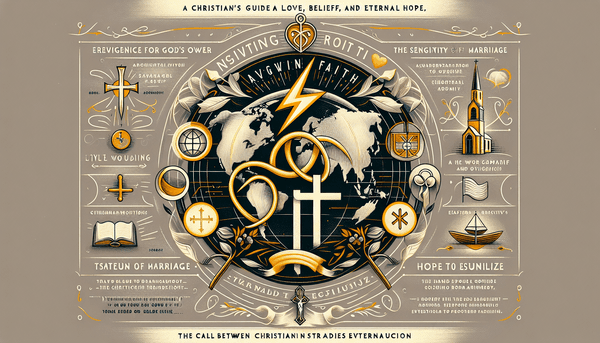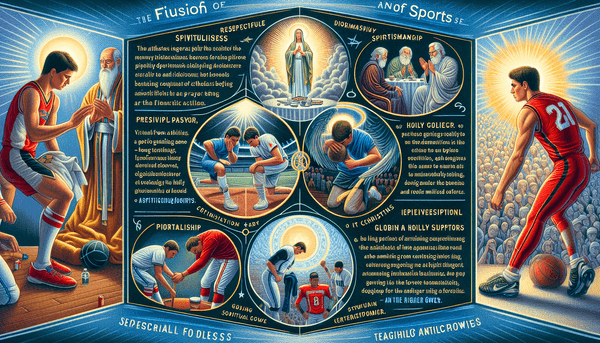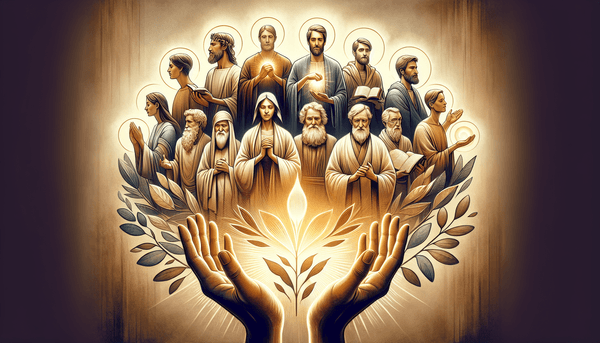Understanding Fear and Love in Christianity
In the Christian faith, fear is often associated with a deep reverence and awe for God's power and authority. Proverbs 1:7 emphasizes the beginning of knowledge with the fear of the Lord, while Psalm 111:10 echoes this sentiment, stating that the fear of the Lord is the beginning of wisdom. Yet, in this reverence, there is also an invitation to experience God's love and protection. Isaiah 41:10 encourages us not to fear, for God is with us, ready to strengthen and uphold us with His righteous hand. This assurance is further underscored in 1 John 4:18, where we're reminded that perfect love drives out fear because fear involves punishment—a concept foreign to those made perfect in love. The Christian journey, then, is one of balancing the natural human response of fear with the transformative power of God's love, a love so vast that nothing can separate us from it, as depicted in Romans 8:38-39.
Sexual Purity and Marriage in Christian Doctrine
The Bible speaks with clarity on the subject of sexual relations, reserving such intimacy for the covenant of marriage. As outlined in 1 Corinthians 7:1-2, the apostle Paul advises that it is good for a man not to have sexual relations with a woman, but to avoid temptation to sexual immorality, each man and woman should have their own spouse. This teaching is reinforced by Hebrews 13:4, which holds the marriage bed in honor, and by Ephesians 5:3, which warns against even a hint of sexual immorality among God's holy people. Physical expressions of love such as cuddling, kissing, and hugging, while natural, should be considered within the boundaries of purity and respect for God's design. The Song of Solomon celebrates the beauty of love and physical affection within the right context, reminding us to not awaken love until the appropriate time (Song of Solomon 8:4). As believers, we are encouraged to seek wisdom and counsel as we strive to honor God in all areas of our relationships, as advised in Proverbs 15:22.
The Personal Call to Evangelize
As followers of Christ, we are entrusted with the Great Commission, a mandate to spread the gospel to all corners of the Earth, as Jesus commands in Mark 16:15 to 'Go into all the world and preach the gospel to every creature.' This call to evangelism is deeply personal and rooted in the conviction of the heart. While Matthew 28:19-20 and Acts 1:8 urge us to make disciples and be witnesses, the Bible also clarifies that salvation is a gift of grace through faith in Jesus Christ, not by our works, as stated in Ephesians 2:8-9. The act of sharing the gospel stems from a response to the love and salvation we have received, rather than from a fear of consequence for not doing so (Romans 10:9-10). Each believer must discern their own path in fulfilling this calling, respecting the guidance of individual conscience as outlined in Romans 14:5.
Differences and Similarities Between Catholicism and Orthodox Christianity
The tapestry of Christian tradition is woven with various threads, including the rich histories of Catholicism and Orthodox Christianity. Stemming from the Great Schism of 1054, these two branches of Christianity have developed distinct liturgical practices and theological interpretations, yet they share a core belief in the divinity of Christ and the truth of the Gospel. Catholics and Orthodox Christians alike look to Scripture for guidance, finding common ground in verses such as John 16:13, which speaks of the Spirit of truth guiding us into all truth, and James 1:27, which defines pure and undefiled religion before God. The unity within diversity among Christians is a testament to the overarching narrative of salvation that binds us together, as Ephesians 4:4-6 reminds us that there is one body, one Spirit, one hope, one Lord, one faith, one baptism, and one God who is Father of all.
Christian Eschatology: The Resurrection of the Dead
The hope of resurrection is central to Christian eschatology, offering a vision of future transformation and eternal life. The New Testament is replete with references to this pivotal event, with 1 Thessalonians 4:16-17 describing the Lord's return and the resurrection of those who have died in Christ. This transformative hope extends to the physical body, as 1 Corinthians 15:52-54 speaks of the mortal putting on immortality when the trumpet sounds. The assurance of sharing in Christ's resurrection is also echoed in Romans 6:5, which speaks of being united with Him in a resurrection like His. The promise of resurrection is not merely a future event; it is the foundation for Christian living in the present, as it directs our gaze towards the eternal glory that is to be revealed in us, a glory so profound that even our present sufferings cannot compare (Romans 8:18).






